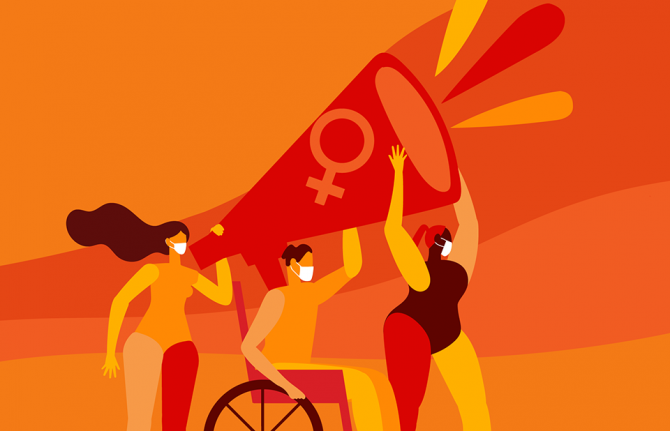

Press Statement
UNAIDS calls for the elimination of the neglected pandemic of violence against women and girls
25 November 2020 25 November 2020GENEVA, 25 November 2020—Today, on the International Day for the Elimination of Violence against Women, UNAIDS is calling for the world to urgently scale up efforts to eliminate the neglected pandemic of violence against women and girls in all their diversity, a widespread human rights violation that affects one in three women at least once in their life.
Prior to the COVID-19 pandemic, it was estimated that globally 243 million women and girls aged 15–49 years had been subjected to sexual and/or physical violence perpetrated by an intimate partner in the past 12 months. Evidence shows that the COVID-19 pandemic has resulted in significant increases in gender-based violence in nearly all countries.
“The growing evidence confirms that the impacts of the COVID-19 pandemic are not gender-neutral,” said Winnie Byanyima, UNAIDS Executive Director. “The impacts of lockdowns and travel restrictions imposed in many countries to curb the spread of the COVID-19 pandemic, the failure to designate sexual and reproductive health services and services for survivors of violence as essential services, and the undermining of women’s economic security have compounded the barriers for women and girls experiencing abuse, especially those who are trapped at home with their abusers.”
Adolescent girls and young women are also increasingly being subjected to early marriage and trafficking, missing out on education because of school closures and lacking access to comprehensive sexuality education and sexual and reproductive health services, including contraception and abortion, as a result of the COVID-19 pandemic.
COVID-19 is increasing violence against women and amplifying existing gender inequalities, further exacerbating HIV risks and vulnerabilities for women, at the same time that access to gender-based violence services, as well as HIV and other sexual and reproductive health services, are being reduced or are unavailable during the pandemic. Violence against women is a major factor driving risks for HIV—in areas with a high HIV burden, such as sub-Saharan Africa, women subjected to intimate partner violence are 50% more likely to be living with HIV. And men who are perpetrators of violence against women tend to be at higher risk of HIV themselves and to use condoms less frequently, thus increasing the risk of HIV transmission.
Violence, or the potential for it, discourages many women and adolescent girls living with HIV from disclosing their HIV status to their partners, families and health-care providers, making it more difficult for women and girls to stay on HIV treatment.
Gender-based violence restricts women’s and girls’ decision-making and erodes their sexual and reproductive health and rights, including deciding if, how, when and with whom they have sex, their ability to protect their health and their ability to access HIV prevention services and stay on treatment.
“The COVID-19 pandemic has reflected once again just how unacceptable it is to continue with half measures and unmet commitments to ending violence against women,” added Ms Byanyima. “If we are serious about achieving gender equality, and ending AIDS, preventing gender-based violence must finally become a global, national and local priority.”
UNAIDS
The Joint United Nations Programme on HIV/AIDS (UNAIDS) leads and inspires the world to achieve its shared vision of zero new HIV infections, zero discrimination and zero AIDS-related deaths. UNAIDS unites the efforts of 11 UN organizations—UNHCR, UNICEF, WFP, UNDP, UNFPA, UNODC, UN Women, ILO, UNESCO, WHO and the World Bank—and works closely with global and national partners towards ending the AIDS epidemic by 2030 as part of the Sustainable Development Goals. Learn more at unaids.org and connect with us on Facebook, Twitter, Instagram and YouTube.
Contact
UNAIDS GenevaSophie Barton-Knott
tel. +41 79 514 68 96
bartonknotts@unaids.org
UNAIDS Media
tel. +41 22 791 4237
communications@unaids.org
